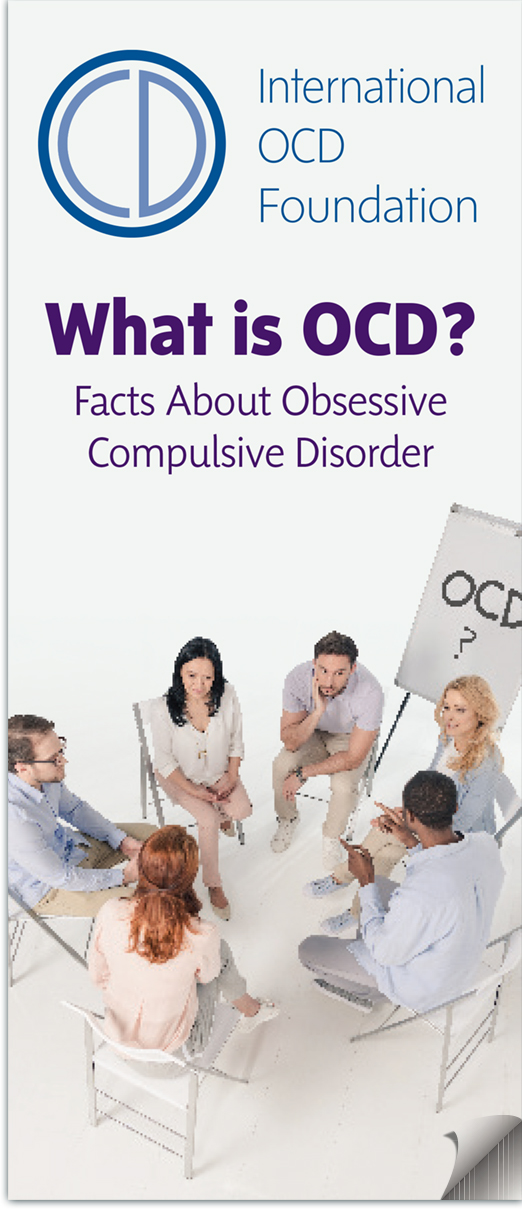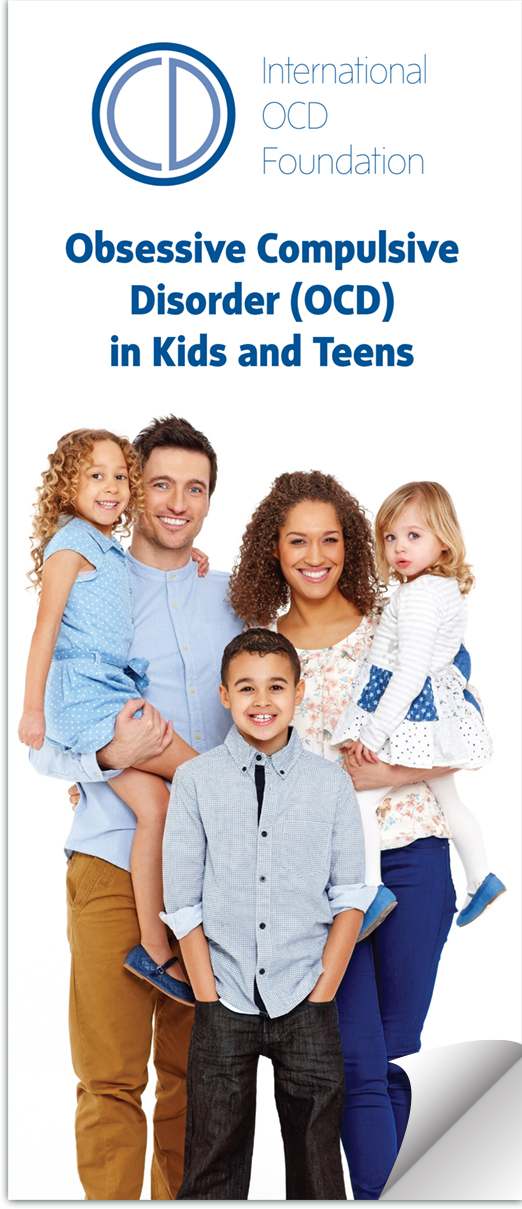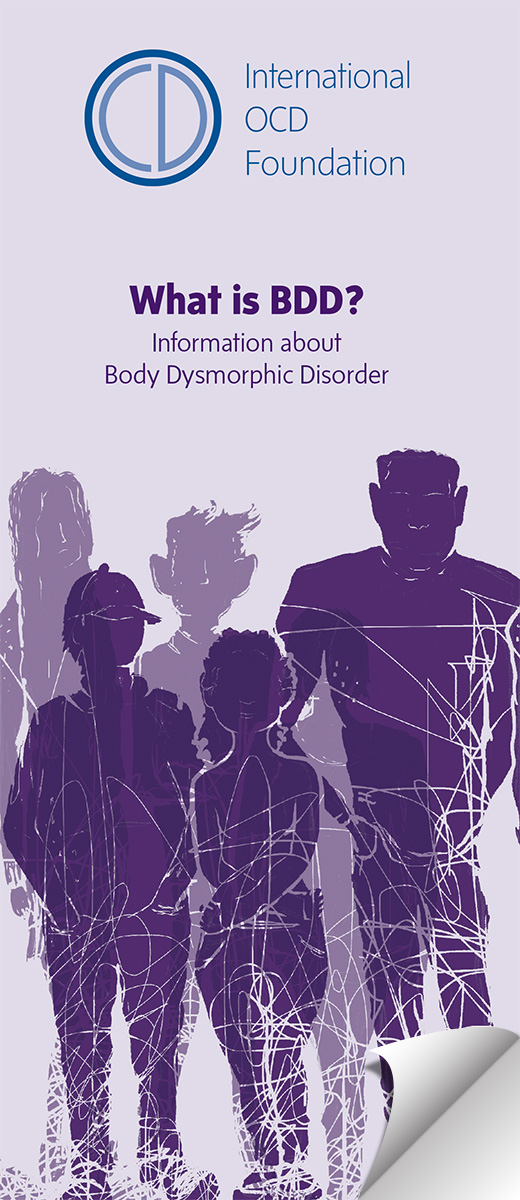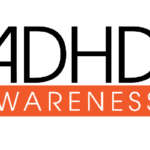The Majority of People with OCD Will Benefit from Therapy and/or Medication
Obsessive-Compulsive Disorder, commonly known as OCD, is more than just a strong desire for cleanliness or organization. It’s a serious mental health condition that affects millions of adults and youth, leading them down paths of repetitive behaviors and unwelcome thoughts. This article aims to break down the common aspects of OCD to help you better understand the condition.
At its core, OCD is characterized by two main components – obsessions and compulsions.
Fast Facts about OCD
- OCD can start anytime in life – from childhood to adulthood.
- According to the International OCD Foundation, about 1 in 100 adults currently have OCD.
- OCD is associated with brain communication irregularities involving serotonin, and research shows that OCD does run in families.
- With proper treatment, many people with OCD can lead full and productive lives.
Helpful Resources and Brochures
OCD Is When a Person Gets Caught in a Cycle of Obsessions and Compulsions
Obsessions
- These are intrusive and unwanted thoughts, images, or urges that can cause significant anxiety or distress. It’s like a song stuck on repeat in your mind that you can’t turn off, no matter how much you try.
Compulsions
- In response to these obsessions, a person with OCD feels driven to perform certain behaviors or mental acts. Think of these as rituals that a person believes will prevent or reduce the distressing thoughts or make them go away.
What Are Common OCD Obsessions?
Understanding OCD means recognizing the various obsessions individuals might experience. Here are some of the most common ones and how they may show up in daily life:
- Fear of Contamination Obsessions
- Fear of Harm / Responsibility Obsessions
- Perfectionism-related Obsessions
- Illness or Body Obsessions
Other common OCD obsessions include religious and moral obsessions, identity obsessions, relationship-oriented obsessions, sexual obsessions, obsessions about death / existence, real event / false memory obsessions, and emotional contamination (fear of catching personality traits of other people).
Let’s dive into each of the top four Obsessions introduced above:
Fear of Contamination Obsessions
When someone has a fear of contamination related to OCD, they are overly worried about being contaminated by germs, dirt, or toxins, even when the risk is very small or nonexistent. This fear isn’t just about not liking dirt or wanting to stay clean; it’s an intense, distressing fear that can interfere with daily life.
Some common perceived contaminated substances are body fluids (urine, feces), germs / disease, environmental contaminants, household chemicals, and dirt.
How Does it Show Up?
Obsessions: The individual might have thoughts like:
- “If I touch that doorknob, I might get sick.”
- “My hands feel dirty, and it’s unbearable.”
Compulsions: To ease the anxiety from these thoughts, the person might:
- Wash their hands many times, even if they’re already clean.
- Avoid touching certain objects or people.
- Clean or disinfect their belongings excessively.
It’s important to remember that while many of us might worry about germs or want to stay clean, for someone with contamination OCD, the fear is intense and can get in the way of everyday activities.
Fear of Harm / Responsibility Obsessions
When someone has a fear of harm related to OCD, they are overly worried about unintentionally causing injury or distress to themselves or others, even when the risk is very small or nonexistent. This fear isn’t just about being momentarily sorry after bumping into someone; it’s an intense, distressing worry that can interfere with daily life.
Some common perceived threats associated with this fear are:
- Fear of harming oneself.
- Accidentally hurting a loved one, either emotionally or physically.
- Leaving appliances on that could lead to a disaster, like a fire.
- Saying something without realizing it that might deeply upset another person.
How Does it Show Up?
Obsessions: The individual might have thoughts like:
- “Did I lock the door? What if someone breaks in because I forgot?”
- “What if I said something earlier and it hurt my friend’s feelings?”
Compulsions: To ease the anxiety from these thoughts, the person might:
- Double-check or even triple-check things, like locks or appliances, to ensure they’re off or secure.
- Repeatedly ask for reassurance from others to confirm they haven’t caused any harm.
- Avoid certain activities or conversations out of fear they might lead to harm.
It’s important to remember that while many of us might occasionally worry about the well-being of others or double-check a locked door, for someone with harm-related OCD, the fear is consuming and can interfere with their everyday activities.
Perfectionism-related Obsessions
When someone has perfectionism-related obsessions tied to OCD, they are overly concerned with making sure everything is just right, flawless, or meeting a very high standard, even when it’s not necessary or possible. This isn’t just about wanting things to look nice or doing well; it’s an intense, distressing need for perfection that can overshadow daily life.
Some common areas where perfectionism might be seen are:
- Tasks or projects, needing them to be completed perfectly.
- Speech and writing, fearing any mistakes or inaccuracies.
- Arrangement of items, requiring them to be aligned or organized in a specific manner.
How Does it Show Up?
Obsessions: The individual might have thoughts like:
- “What if my project isn’t the best? It needs to be perfect.”
- “I might have made a mistake in that email. I need to read it again.”
- “Those books on the shelf aren’t aligned. It doesn’t feel right.”
Compulsions: To ease the anxiety from these thoughts, the person might:
- Redo tasks multiple times until they feel they’ve achieved perfection.
- Re-read or rewrite sentences or entire documents over and over.
- Rearrange objects continuously until they feel “just right” in arrangement.
While many of us might aim for excellence or feel proud of doing a job well, for someone with perfectionism-related OCD, the need for perfection is intense and can hinder their ability to complete tasks or enjoy everyday moments.
Illness or Body Obsessions
When someone has illness or body obsessions related to OCD, they are overly concerned about having a severe medical condition or excessively focus on certain bodily functions or appearances. This isn’t just about occasional self-consciousness or routine health concerns; it’s an intense, distressing preoccupation that can interfere with daily life.
Some common areas where illness or body obsessions might manifest are:
- Fear of having a serious undiagnosed illness, despite medical reassurances.
- Constant attention to normal bodily sensations, interpreting them as symptoms of a disease.
- Excessive worry about perceived physical flaws or imperfections, which may overlap with Body Dysmorphic Disorder.
How Does it Show Up?
Obsessions: The individual might have thoughts like:
- “What if this headache is a sign of a brain tumor?”
- “I can feel my heart beating – is there something wrong with it?”
- “People are staring at my nose; they must think it’s too big.”
Compulsions: To ease the anxiety from these thoughts, the person might:
- Frequently visit doctors or seek medical tests for reassurance.
- Constantly check the mirror or avoid it altogether.
- Seek constant reassurance from others about their health or appearance.
While many of us might occasionally worry about our health or have moments of self-consciousness, for someone with illness or body-related OCD, these concerns are all-consuming and can significantly impact their ability to function and enjoy life.
What Are Common OCD Compulsions?
Understanding OCD also involves being aware of the various compulsions that individuals might engage in as a response to their obsessions. Here are some of the most common ones and how they may manifest in daily life:
- Excessive washing or cleaning
- Checking and rechecking
- Counting, tapping, or repeating rituals
- Mental compulsions
- Ordering and arranging
- Hording or saving items
Other common OCD Compulsions include:
Praying or performing religious rituals excessively, rewriting or rereading text, mentally counting or praying to neutralize obsessions, avoiding places, people, or activities, or seeking constant reassurance from others about decisions or memories.
These compulsions are typically performed in an attempt to reduce or prevent the anxiety or distress caused by the obsessions or to prevent a feared event or situation. However, in many cases, the compulsions end up causing significant distress themselves and can be very time-consuming.
Let’s walk through a few of the most common compulsions as outlined above in the bulleted list.
Excessive Washing or Cleaning Compulsions
When someone has excessive washing or cleaning compulsions related to OCD, they feel an overwhelming need to cleanse themselves or their surroundings, often beyond what is required or typical. This isn’t just about liking cleanliness or following a regular hygiene routine; it’s an intense, distressing urge that can disrupt daily life.
Some common triggers for excessive washing or cleaning compulsions might be:
- Fear of coming into contact with harmful germs or contaminants.
- Anxiety about dirt or filth, which may not be visible to others.
- Concerns about getting sick or contracting a disease due to perceived contamination.
How Does it Show Up?
Obsessions: The individual might have thoughts like:
- “If I don’t wash my hands repeatedly, I might get sick.”
- “What if the surfaces in my house aren’t clean enough and harm my family?”
- “I touched that object, and now I feel dirty and contaminated.”
Compulsions: To ease the anxiety from these thoughts, the person might:
- Wash their hands multiple times in succession, even if they just washed them.
- Clean and disinfect their house or specific items repeatedly.
- Avoid certain places or objects they deem “dirty” or “contaminated.”
While many of us appreciate a clean environment and practice good hygiene, for someone with excessive washing or cleaning compulsions in OCD, the urge to cleanse goes beyond the norm and can significantly impact their ability to function and enjoy life.
Checking and Rechecking Compulsions
When someone has checking and rechecking compulsions related to OCD, they feel an overpowering need to verify actions or information repeatedly. This isn’t just about being thorough or double-checking occasionally; it’s an intense, distressing ritual that can consume a lot of time and disrupt daily life.
Some common scenarios triggering checking and rechecking compulsions might be:
- Concerns about safety, like whether doors are locked or appliances are turned off.
- Doubts about one’s memory or actions, often wondering if something was done correctly.
- Worry about causing harm to oneself or others due to oversight.
How Does it Show Up?
Obsessions: The individual might have thoughts like:
- “Did I really lock the door? What if someone breaks in?”
- “I might have left the stove on, and it could cause a fire.”
- “I can’t remember if I sent that email. Did I say something wrong?”
Compulsions: To ease the anxiety from these thoughts, the person might:
- Go back multiple times to check the door lock.
- Repeatedly verify the stove is off, even if they haven’t used it.
- Review sent emails or messages multiple times to confirm their content.
While many of us occasionally second-guess our actions or check something for peace of mind, for someone with checking and rechecking compulsions in OCD, these actions become all-consuming rituals. They can severely affect their ability to move on with their day and enjoy life.
Counting, Rapping, or Repeating Rituals
When someone has OCD compulsions related to counting, tapping, or repeating, they feel a compelling need to perform specific actions a set number of times or in a particular sequence. This isn’t about a simple habit or preference; it’s an intense, distressing routine that can seem peculiar to others and interfere with everyday activities.
Some common scenarios triggering counting, tapping, or repeating compulsions might be:
- Beliefs that certain numbers are “safe” or “dangerous.”
- Fear that if a particular action isn’t performed just right, something bad will happen.
- Trying to counteract or neutralize a negative thought with a specific action.
How Does it Show Up?
Obsessions: The individual might have thoughts like:
- “If I don’t tap the table three times, something bad will happen to my family.”
- “I need to count to 100 before I leave a room, or I’ll have bad luck.”
- “Repeating this phrase in my head will prevent the negative event I’m thinking about.”
Compulsions: To ease the anxiety from these thoughts, the person might:
- Tap on surfaces a specific number of times before moving on.
- Count steps, items, or repeat sequences in their head or aloud.
- Repeat certain phrases or actions multiple times until it “feels right.”
While many of us might have routines or habits that provide comfort, for someone with counting, tapping, or repeating rituals in OCD, these actions go beyond comfort. They become mandatory tasks that if not completed can lead to overwhelming anxiety. Such compulsions can significantly interfere with the ability to function and enjoy life.
Mental Compulsions
When someone has mental compulsions, they feel a pressing need to engage in certain thought patterns or mental exercises. This isn’t about daydreaming or occasionally replaying memories; it’s an intense, internal ritual that might seem invisible to the outside world but can be highly disruptive to the person’s mental peace.
Some common triggers for mental compulsions might include:
- Fear of harmful events happening unless they perform a specific mental ritual.
- Belief that certain thought patterns can neutralize negative thoughts or prevent bad outcomes.
- The urge to “get a thought right” or to think of something in a specific way.
How Does it Show Up?
Obsessions: The individual might have thoughts like:
- “If I don’t mentally recite this prayer, my family will be harmed.”
- “I must replay that conversation in my head until I’m sure I didn’t say anything wrong.”
- “Thinking of a happy memory will counteract the bad thought I just had.”
Compulsions: To ease the anxiety from these thoughts, the person might:
- Mentally recite prayers, phrases, or sequences, often repeatedly.
- Repeatedly analyze past events or conversations in their mind.
- Force themselves to think specific “safe” or “good” thoughts to counteract perceived negative or harmful ones.
While everyone has a unique inner monologue and personal reflections, for someone with mental compulsions in OCD, these internal rituals can become so dominant that they interfere with their ability to focus on the present moment, make decisions, and enjoy life.
Ordering and Arranging Compulsions
When someone has compulsions related to ordering and arranging in OCD, they feel a strong need to position objects or perform tasks in a very particular manner or sequence. This isn’t just about liking things tidy or being systematic; it’s an intense, distressing need for precision that can greatly disrupt everyday living.
Some common triggers for ordering and arranging compulsions might include:
- Belief that there’s a “right” way items should be positioned, and any deviation could be harmful or “feel” wrong.
- Fears that if things are not arranged perfectly, it might lead to a negative event.
- The need for symmetry or to avoid any sense of imbalance in their surroundings.
How Does it Show Up?
Obsessions: The individual might have thoughts like:
- “If my books aren’t in perfect order, I won’t be able to relax or concentrate.”
- “These items need to be symmetrical, or something bad might happen.”
- “Everything on my desk must be at right angles, or I’ll have a terrible day.”
Compulsions: To ease the anxiety from these thoughts, the person might:
- Spend excessive time rearranging objects until they “feel right.”
- Measure distances between items or check alignments repeatedly.
- Become distressed when objects are moved or disrupted, needing to reset them immediately.
While many people appreciate orderliness and have personal preferences for how their environment looks, for someone with ordering and arranging compulsions in OCD, these preferences elevate to strict necessities. Not adhering to them can lead to overwhelming anxiety, severely impacting their ability to function and enjoy daily life.
Hording or Saving Compulsions
When someone has OCD compulsions related to hoarding or saving items, they feel an overwhelming need to keep and accumulate objects, often beyond what is necessary or even useful. This isn’t just about being sentimental or wanting to keep mementos; it’s an intense, distressing urge to save things that can lead to clutter and, in severe cases, unlivable conditions.
Some common triggers for hoarding or saving items compulsions might include:
- Fear that discarding an item might lead to regret or a significant loss in the future.
- Belief that certain items hold a unique value or importance, even if they seem trivial to others.
- Concerns about wasting or being seen as ungrateful if items are thrown away.
How Does it Show Up?
Obsessions: The individual might have thoughts like:
- “I might need this old magazine in the future. What if there’s information in it that I will need someday?”
- “Throwing this away would be wasteful, even if I haven’t used it in years.”
- “This broken item might have a purpose one day, or it could be repaired and I could sell it for money.”
Compulsions: To ease the anxiety from these thoughts, the person might:
- Avoid throwing away or donating items, leading to excessive clutter.
- Store or stash away objects, sometimes in an unorganized manner, making living spaces difficult to navigate.
- Experience distress at the thought of parting with possessions, even if they have no apparent use or value.
While many people have items they cherish or find it hard to part with certain belongings, for someone with hoarding or saving compulsions, the need to accumulate goes far beyond typical attachment. The compulsion can overwhelm their living space and, in extreme cases, can lead to health and safety concerns. It’s essential to recognize that hoarding due to OCD is distinct from hoarding disorder, although there can be some overlap.
Help Is Available!
The first step is to talk with an experienced psychiatrist about your OCD symptoms in order for your provider to make an accurate diagnosis. Your provider will ask about your health history during your exam.
Most studies show that the most effective treatments for OCD include psychotherapy (such as Cognitive Behavioral Therapy), medication, or a combination of the two.
Our Experienced Team of Psychiatrists Can Help!
We know that taking the first step can be difficult.
Our highly-trained psychiatrists and therapists offer a comprehensive and confidential approach to private, outpatient psychiatric care. Whether this is your first time seeking psychiatric care or if you are seeking a new provider, Novum Psychiatry can help. In-person and telehealth appointments available. We accept health insurance.








